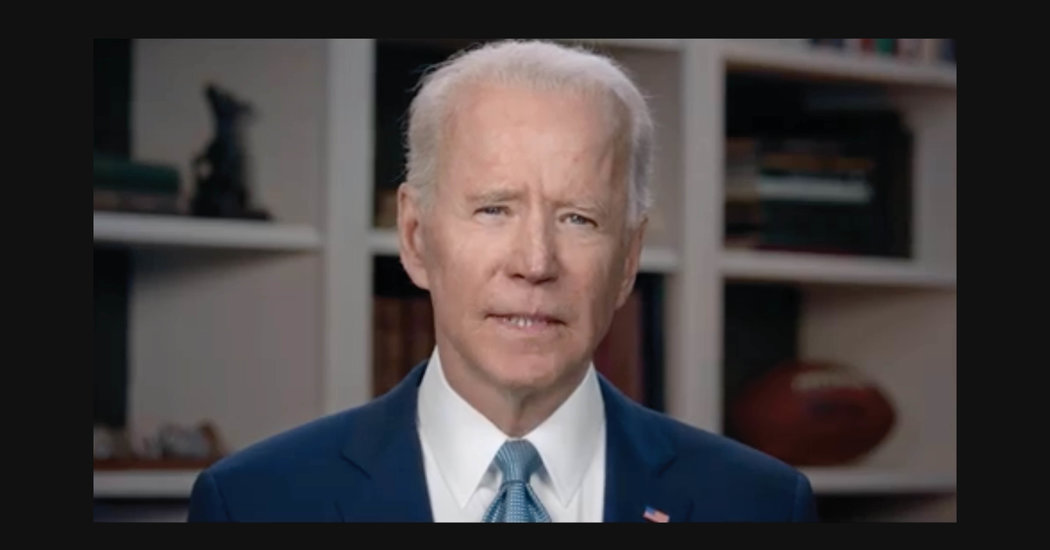[ad_1]
Sign up here to get On Politics in your inbox every weekday.
The country is facing one of the darkest periods in our history. Our citizens are sick, more than 50,000 are dead and the economy is bleeding.
In the middle of all this fear and anxiety, there is a presidential race that will ask Americans to make a deeply consequential political choice. No, not between two soaring visions for the future or between two detailed policy plans for coronavirus containment and rebuilding.
The choice, as it stands right now, is between a candidate who is actively pushing dangerous medical advice in the form of ingesting cleaning products, and another who is … trapped in his basement?
That’s what became clear this weekend, as politicians, strategists and voters grappled with the fallout from President Trump’s suggestion that “injection inside” the human body with a disinfectant like bleach could help combat the virus.
Unable to contain the spread of the disease, White House officials focused instead on containing the president. His briefings were shortened and then canceled altogether over the weekend. The hiatus didn’t last long. The one on Monday was canceled and then put back on the schedule a few hours later. Mr. Trump was left to his usual tactics of ranting against Democrats and the news media on Twitter.
Even before the president appeared to prescribe Clorox to the public, the briefings had begun to make many Republicans cringe. Mr. Trump had not only been unable to sustain the bump in approval that presidents typically get in moments of crisis, he also seemed to be doing active damage to himself with his freewheeling afternoon cable news show. This is not surprising: Throughout his time in office, when Mr. Trump has made himself the story, his numbers have tended to slide.
As Mr. Trump has dominated the country’s attention, some Democrats are wondering where their presumptive presidential nominee, Joe Biden, is. Recent polling has the answer: in the lead.
Public polling of Pennsylvania and Michigan shows Mr. Trump losing outside the margin of error. But even states considered to be harder terrain for Democrats are tilting in Mr. Biden’s favor. Polling of Ohio and Florida — states many Democrats considered lost — show Mr. Biden with a narrow lead. Fears are mounting among Republicans that Mr. Trump may drag down their ticket, costing them control of the Senate and even more seats in the House.
But the race is moving toward Democrats for reasons that seem to have very little to do with Mr. Biden.
Like so many of us, Mr. Biden has been spending his days in isolation, walled off from the very voters he hopes to win.
As my colleagues reported over the weekend, he’s waking up before 8 a.m., jumping on the Peloton, reading briefing memos, talking to experts, holding fund-raisers and virtual town halls. He has limited interactions with the news media and voters. At a moment when Americans crave Mr. Biden’s political superpower — his deep sense of empathy — the former vice president has chosen to stay largely on the sidelines.
Some Democrats say it’s a smart strategy. As much as possible, they want this election to be a referendum on Mr. Trump, hoping the president undermines his own case for another term with his handling of the virus.
Yet, there are risks to this period for Mr. Biden. In some ways, it seems to encourage some of his worst political instincts. His indecision. (Don’t forget, he hesitated for months before deciding whether to even run for president.) His focus on the theoretical, rather than on immediate problems. (My colleagues reported that Mr. Biden is far more focused on the economic recovery he hopes to preside over in 2021 than on the nitty-gritty of the race he must win to get there.) And while keeping Mr. Biden in a candidate protection program prevents him from making gaffes, he risks losing the muscle memory for disciplined campaigning.
Eventually, Mr. Biden must re-emerge from his basement. Sure, the campaign is unlikely to resemble presidential races of the past; no one expects huge rallies or splashy conventions. But as Election Day nears, Mr. Biden will have to start campaigning in whatever form he can.
That’s when the real political test will come. Is Mr. Biden ready for more adversarial interviews? Republicans have already made clear that they plan to portray his voluble style as that of a doddering candidate well past his prime. Can he defend a decades-long record that puts him on the wrong side of some major issues, like trade and the Iraq war, for voters in both parties?
Bailout packages, protests, vote by mail and a presidential campaign: There’s so much to follow when it comes to coronavirus politics.
Curious why we can’t all vote online? Or what’s next for Congress to take up?
Email us at onpolitics@nytimes.com with all your politics questions. We’ll try to answer them in a future edition. As always, please remember to include your name and where you live.
Were you forwarded this newsletter? Sign up here to get it delivered to your inbox.
Thanks for reading. On Politics is your guide to the political news cycle, delivering clarity from the chaos.
Is there anything you think we’re missing? Anything you want to see more of? We’d love to hear from you. Email us at onpolitics@nytimes.com.


















